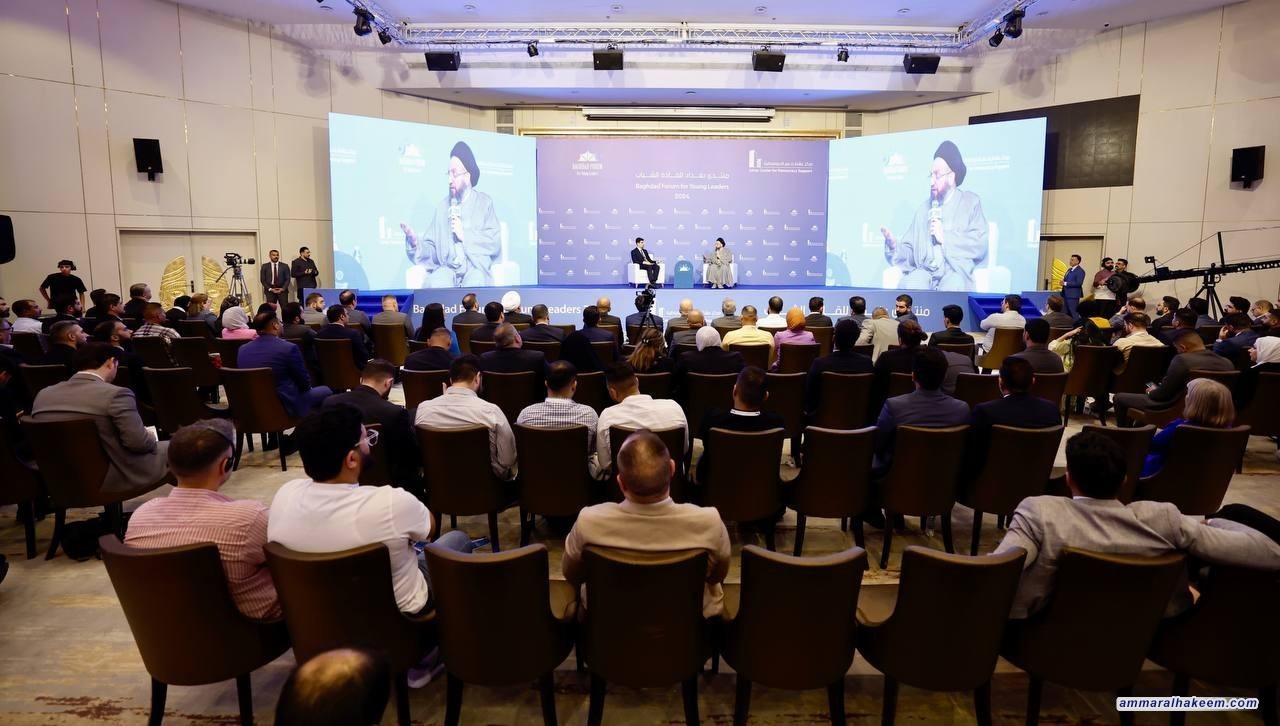Sayyid Al-Hakeem: Youth are a Key Pillar in Our Society, Requiring Care and Empowerment
During his participation in the Baghdad Forum for Young Leaders, organized by the Ishtar Foundation, Sayyid Ammar Al-Hakeem, head of Al-Hikma National Movement, expressed his delight at such forums. His Eminence emphasized that youth are a vital component of Iraqi society due to their significant numbers, necessitating their care and empowerment. H.E. highlighted the importance of considering current requirements, technological advancements, and information trends.
H.E. pointed out the major intellectual and social challenges facing youth, particularly drug abuse. H.E. called for empowerment measures that match youth capabilities and urged trust in Iraqi youth, highlighting successful examples among them. H.E. noted that Al-Hikma Movement has empowered young people in various roles, including the governors of Najaf and Dhi Qar, and stressed the importance of having young ministers. H.E. advocated for learning from youth empowerment experiences in the region and globally, addressing the challenge of a rentier economy and the temporary nature of high oil prices. H.E. urged a shift towards a diversified economy based on agriculture, industry, tourism, investment, and technology, which could open employment opportunities for youth and make them active and productive members of society.
H.E. stated that cultural and intellectual work was a primary focus before engaging in political responsibilities. H.E. asserted a belief in generational integration rather than displacement, comparing political methodology to family dynamics, where each member has a role.
Sayyid Al-Hakeem explained that generational needs vary with each stage, giving each generation distinct characteristics. The recent generations have different priorities and challenges due to technological and informational advancements. H.E. noted that the conservative nature of society and tribal characteristics help prevent young people from veering towards harmful ideas, while life challenges and accumulated experiences enable youth to reassess priorities and update their perspectives on societal, state, and political issues.
H.E. Stated that Al-Hikma Movement anticipated the October protests by two and a half months by positioning itself in the opposition, expressing dissatisfaction with the political trajectory at that time. The Movement had confidence in several protest leaders, despite recognizing attempts to exploit the youth movement for other purposes. H.E. described the initial enthusiasm and momentum of any movement as natural, noting that participants eventually discover varying ideological streams within the movement. H.E. observed that Al-Hikma Movement’s approach to the October protests remained consistent, although the movement itself evolved into parties with distinct views and interpretations of events.
Regarding freedoms, H.E. stated that freedom is a right, provided it does not infringe on others or conflict with their freedoms. H.E. stressed that accusations made in the name of freedom require evidence to avoid direct targeting, and the need to define the boundaries of freedom according to law and prevailing norms.
H.E. praised Prime Minister Al-Sudani's successful performance, which positively reflected on the supporting powers, emphasizing the public satisfaction with the government and political forces, as evidenced by the recent election results. H.E. noted that Al-Sudani's prior successes led the Coordination Framework to empower him as Prime Minister.
H.E. concluded by highlighting that Al-Hikma Movement is characterized by its youthful base, with youth making up a significant portion of its members and holding leadership roles within its internal structures and governmental positions.


/9/3/photo_2025-12-10_09-25-13.jpg)
/9/2/photo_2025-12-10_09-17-58.jpg)
/9/1/photo_2025-12-10_09-11-13.jpg)
/8/3/photo_2025-12-09_10-42-49.jpg)
/8/2/photo_2025-12-09_10-37-31.jpg)
/8/1/photo_2025-12-09_09-54-18.jpg)
/7/1/photo_2025-12-08_09-38-41.jpg)
/5/1/photo_2025-12-07_09-25-35.jpg)
/3/2/photo_2025-12-04_11-05-55.jpg)
/3/1/photo_2025-12-03_11-49-28.jpg)